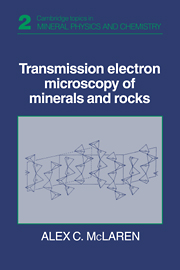Book contents
- Frontmatter
- Contents
- Preface
- Introduction
- 1 Principles of image formation by a lens
- 2 The transmission electron microscope
- 3 Kinematical theory of electron diffraction
- 4 Dynamical theory of electron diffraction
- 5 The observation of crystal defects
- 6 High-resolution transmission electron microscopy
- 7 Chemical analysis in the transmission electron microscope
- 8 Mineralogical applications of TEM – I. Defects and microstructures in undeformed specimens
- 9 Mineralogical applications of TEM – II. Dislocations and microstructures associated with deformation
- References
- Index
Preface
Published online by Cambridge University Press: 07 October 2009
- Frontmatter
- Contents
- Preface
- Introduction
- 1 Principles of image formation by a lens
- 2 The transmission electron microscope
- 3 Kinematical theory of electron diffraction
- 4 Dynamical theory of electron diffraction
- 5 The observation of crystal defects
- 6 High-resolution transmission electron microscopy
- 7 Chemical analysis in the transmission electron microscope
- 8 Mineralogical applications of TEM – I. Defects and microstructures in undeformed specimens
- 9 Mineralogical applications of TEM – II. Dislocations and microstructures associated with deformation
- References
- Index
Summary
Of the many techniques that have been applied to the study of crystal defects, probably no single technique has contributed more to our understanding of their nature, properties, and influence on the physical and chemical properties of crystalline materials than transmission electron microscopy (TEM). Although the importance of crystal defects and the use of TEM for their direct observation were recognized by physical metallurgists in the early 1950s, it was at least a decade later that earth scientists responded to many of the new ideas of the defect solid state and to the power of TEM. However, TEM is now used extensively for the direct observation of defect microstructures in minerals and rocks, and there appears to be an increasing number of earth scientists who want to use the technique or to become more familiar with the interpretation of TEM observations. This book is written for such people. However, it makes no attempt to be a practical manual of TEM or a definitive text, but rather an introduction to the basic principles of the technique and of the interpretation of electron micrographs and electron diffraction patterns. As such, I hope the book will also be useful to students of materials science.
- Type
- Chapter
- Information
- Transmission Electron Microscopy of Minerals and Rocks , pp. ix - xiiPublisher: Cambridge University PressPrint publication year: 1991

